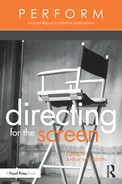CHAPTER 1
GETTING STARTED
“Never treat anything you do as a stepping stone. Do it fully, and follow it completely.”
Mira Nair
you won’t find an advertisement for the job of feature film director for a $100-million film on LinkedIn—or even on a more targeted job search site, like Mandy. Nobody’s doing a nationally advertised search for the next blockbuster feature director—and the same goes for television. Want to direct a hit sitcom? You won’t find an ad for that gig online.
This is where the film and television industry differs from other industries. If your ultimate goal were to run the national sales division for a high-end car company, you could find and apply for the job online. That’s not where you would start, of course, with a title of National Sales Director. But you could find the job advertised, and you could even see the job description.
It’s the lack of advertisements for jobs that often intimidates aspiring directors, along with the daunting notion that it’s all “who you know” that gets you in the door. What if you don’t know anyone? What if you don’t have family connections? What if you grew up in a remote part of a country where nobody dreams of becoming a filmmaker? What if even suggesting that you might harbor this secret aspiration would make you look flakey, head-in-the-clouds, and self-involved? And if you talk confidently about this goal, like you think it might actually happen, will people shake their heads and talk in quiet whispers when you leave the table to refill your coffee? Are you allowed to dream that big and share those dreams with friends who aim for something more practical?
Who Knew?
Our most esteemed directors were big dreamers. Oliver Stone wrote plays for his family as a child. He later went to Yale and dropped out after a year to teach high school in Saigon. While traveling, he wrote a 1,400-page novel, which he finally edited down and published thirty years later.1 Paul Thomas Anderson made a thirty-minute mockumentary as a senior in high school, which inspired his film Boogie Nights.2 Sofia Coppola dropped out of college and started a fashion line before trying her hand at directing.3 She made her first short film in 1998 and her first feature, The Virgin Suicides, one year later in 1999.
Dreaming big isn’t just allowed—it’s a requirement for the aspiring director. You can’t make films without first dreaming them up. Visualizing the success of your future films is only natural. As Nora Ephron said, “I don’t care who you are. When you sit down to write the first page of your screenplay, in your head, you’re also writing your Oscar acceptance speech.”4
This first chapter is about breaking in and getting started as a filmmaker. Here’s what we’ll cover:
• Getting an internship and what it takes to shine
• Working for a producer
• Finding an in as a script supervisor
• What to expect in your working relationship with a cinematographer
• Getting started in local television
• Working with comedic actors
• Why it’s a good idea to have multiple projects in different stages of development
• Finding and learning from mentors
• Directing a short film that you can use as a calling card
Let’s begin there, with finding mentors and making short films, both necessities for the aspiring director. You can’t expect to build a career without mentorship, and making a short film is the most logical way to showcase your talent. Elizabeth Allen Rosenbaum credits her short film and her mentors with jumpstarting her directing career.
